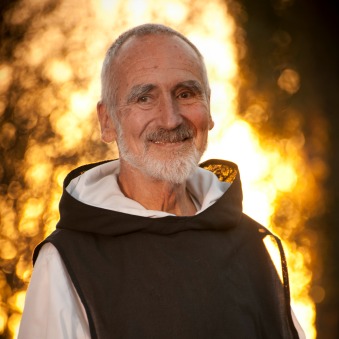Q: How can I find joy in the world, when what I see in much of humanity disappoints me? This is a serious question, and even though I try to focus on seeing the best in people, and in seeing opportunity in life’s challenges…when I see people disrespecting animals, the Earth and each other…it hurts me to my very core. How can I witness the pain, abuse and intentional suffering without suffering myself?? How can I heal this hurt in my heart without closing myself completely to all feeling? I guess I am a very sensitive person. I just don’t want to become bitter or cold. Thanks and blessings to all, — Crista Joyelle, Hamilton, Ontario, Canada
A: Thank you, Crista, for voicing a question which many others carry around with them without being able to put it into words. Two keywords in your question are “joy” and “suffering.” These two exclude each other at first sight. But let us take a second look. Haven’t we sometimes experienced “joyful suffering”? A mother who is grateful for giving birth to a baby does suffer much when she is in labor, but joyfully so. Sport often causes pain, but for, say, boxers who get punched in the nose, or soccer players who get kicked in the shin, this suffering simply belongs to something they enjoy. The opposite of joy is grief and distress, not pain and suffering. St. Paul writes to the Colossians (1:24): I “rejoice in my sufferings for you.” Unpleasant experiences for the sake of someone we love or for an issue close to our heart – say, human rights or peace and justice – can fill us with deep inner joy. Martyrs like Gandhi or Martin Luther King bear witness to this; so do those who suffer for defending animal rights or the rain forests.
You are sensitive to all these issues, Crista, and so you suffer. Gratefulness will not take away this suffering, but transform it into joyful suffering. How? By making you realize that your very sensitivity is a gift – a great gift. Would you want to be insensitive instead? Would you want to be one of those who disrespect animals, the Earth, and each other, because they are less sensitive than you are? Your pain makes you aware of a deep communion with those for whom you feel such compassion. This communion in turn gives meaning to your life and a joy which you could not find in any other way. It may even give you an incentive to stand up for others who suffer. Does this ring true to your experience?
We speak of the healing power of gratefulness. This doesn’t mean that gratefulness does away with pain and suffering. Gratefulness doesn’t cure suffering, but heals it – makes it meaningful and life-affirming, saves you from closing yourself off, from becoming bitter and cold. Sooner or later, to live means to suffer; but if you live gratefully you can through suffering become more creative and more truly yourself.
— Your Brother David
Say Yes to Joy
How might your daily life change if you could experience more joy, even alongside sorrow? In this self-guided series, discover tangible grateful living practices to welcome more joy into your life.



Comments are now closed on this page. We invite you to join the conversation in our new community space. We hope to see you there!